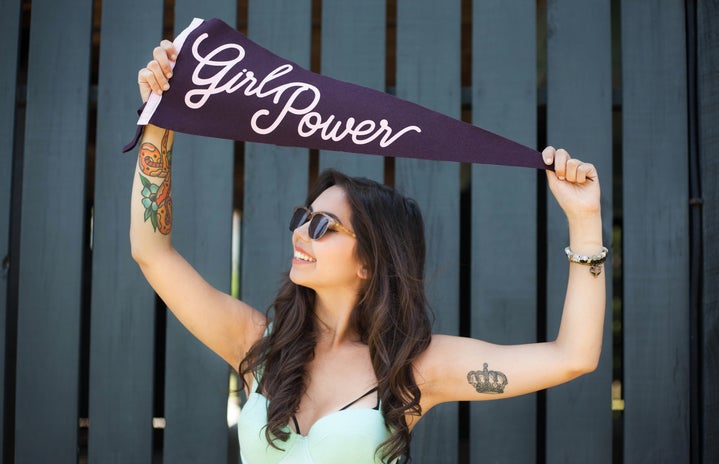Edited by: Janani Mahadevan
In the year that our uniforms changed color and all our teachers insisted on calling us young adults, I heard the F-word for the first time in our classroom. You know, the one symbolizing equal rights and autonomy and smashing the patriarchy and so much more: Feminism. Of course, the term had been thrown around amongst ourselves in conversations, kicked around like an old football battered by contempt and mockery over the years. You could even find it slapped across various social media posts and their comment sections like ugly insults and unwanted branding. Quite simply, it was more informal, popular slang than an official ideology. In retrospect, it is disappointing that it took sixteen years for the word feminism to even be mentioned, let alone discussed, in an academic space.
It was the first week of eleventh grade, a time of getting used to the strange mix of the ‘I don’t know you at all’ strangers, the ‘I can’t quite place your face’ acquaintances, and the ‘We’ve been in the same class since first-grade’ friends. One of the students in my unfamiliar class asked our teacher, “Ma’am, are you a feminist?”. In the silence that followed, the thirty-something of us who were both familiar and unfamiliar to each other shared a single similarity: our piqued curiosity. I remember now that I desperately wanted my teacher to say yes back then. At that point, I didn’t understand why the stereotypical loud and opinionated image of a feminist had such negative connotations to its name. Even if I humored the stereotype, why was it wrong for a woman to have opinions? Why was it wrong to be loud? Why was it wrong for a woman to be loud about her opinions?
My teacher said she wasn’t a feminist.
“Why?” we asked.
“Let me ask you something. Can your mom do what your dad does?”
“No,” came the sing-song chorus.
“Then, can your dad do what your mom does?”
“No,” came the traitorous chant.
“That’s why I’m not a feminist.”
The hum of people murmuring followed, gradually swelling to a cacophony; the conversation had died, the once-palpable curiosity seemingly satisfied. To this day, I regret that I had not said anything then. Over the years, I’ve replayed that memory a million times. I’ve imagined and reimagined voicing my disagreement and framing the words differently each time because they never sounded right. However, the idea always remained the same: it isn’t about whether a woman can do what a man can or vice versa. It’s about having the choice to do what they want to do, especially when they can do it, perfectly or imperfectly — and even possibly excel at it.
I’ve seen and heard the same argument my teacher made that day being used by different people at various points in my life. It’s a very cunning response. Of course your mom can’t do what your dad can. Of course your dad can’t do what your mom can. Why? Because that’s how they’ve lived their entire lives, acting out the roles that were assigned to them even if they were not fully compliant. Even if we set aside problematic gender roles, the argument deviously does not generalize. When someone asks if your mom can do what your dad can or vice versa, you’re most probably not thinking about your mom as a woman and your dad as a man. They’re just your mom and dad. Imagine how different the answer would be (and if people did their research!) if the question had been, “Can a woman do what a man can? Can a man do what a woman can?”
Perhaps, a man can do some things better than a woman can and vice-versa. This comparison is not absolute; it does not mean that a woman absolutely cannot do what a man can and the other way around. It may just be that they’re both capable in their own ways and one is simply better than the other at that particular task. Another contention I have with the argument is that it manages to expertly focus your attention on what your dad or your mom cannot do. As a result, you forget to notice what they can do, if only they had the choice. Well, sure, they can just do whatever they want. There is no physical constraint (most times). However, how often is the social environment favorable towards people who want to break stereotypical roles?
Until today, our right to have a choice evades us. Even when a so-called “choice” is present, it is like a mirage; it comes with social consequences of hate and isolation so harrowing that one can no longer tell if a choice exists at all. It is this same social environment that shamelessly avoids even referring to the word “Feminism” in a school classroom. When I came to college, I was bombarded with the term in almost every academic and social space. The whiplash this experience gave me was eye-opening. It was in college, at nineteen years of age, that I came to know that perhaps the inconspicuous Anon below a poem’s name was probably a woman. It was in this space that I first Googled the term intersectional feminism. Today, I mourn for what I could have had during my school days. If only, I think. If only I had known that it was not wrong to voice my opinion, to want equal rights and opportunities, to crave autonomy. If I had known earlier, if all my peers had known earlier, how much of a difference would it have made?
I say we would have ruled the world much earlier.


